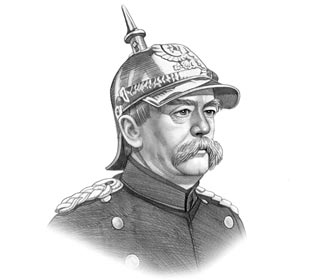
|
Political Leaders
|
|
 |
Sir Winston
Churchill
Sir Winston Leonard Spencer-Churchill, born
on November 30, 1874, is best known for his
role as Britainís Prime Minister during
World War 2. Born to Lord Randolph Churchill
and American Jennie Jerome, Churchill was
also the grandson of the 7th Duke of
Marlborough. Churchill attended school at
Harrow before becoming a cavalry cadet at
the Royal Military College, Sandhurst, and
being commissioned into the 4th Hussars as a
Second Lieutenant. Eager to see action,
Churchill served in British India and took
part in both the Anglo-Sudan War and the
second Boer War. He became a war
correspondent, sending reports back to the
Daily Telegraph and the Pioneer, and wrote
books about his campaigns. In 1899,
Churchill decided to become a politician,
gaining his first Parliamentary seat in
1900. He was appointed First Lord of the
Admiralty during WW1 and WW2 before becoming
Prime Minister on May 10, 1940. Churchill
became the subject of a conspiracy theory
which accused him of being complicit in the
sinking of RMS
Lusitania in an effort to bring the
United States into WW1. One of
Churchill's most famous orders during WW2
was the order to 'Sink the
Bismarck!'. Churchill was
knighted in 1953 and died on January 24,
1965. |
 |
Adolph Hitler
Adolph
Hitler, born on April 20, 1889, in Braunau
am Inn, Austria-Hungary, is best known for
initiating World War 2, as the Fuhrer of
Germany, and the Holocaust. After moving to
Germany, Hitler served in World War 1 as a
dispatch runner in the Bavarian Army.
Following the end of the war, Hitler was
employed by the army as an intelligence
agent and was ordered to infiltrate the
German Workers Party. After leaving the army
he worked full time for the organization,
and by the end of July 1921, had become
their leader. In November 1923 Hitler was
jailed for treason after the failure of an
attempted coup in Munich. His popularity
rose after leaving prison and he was
appointed Chancellor of Germany by the Nazi
Party in 1933. In August 1934 Hitler became
the Fuhrer of Germany, and on September 1,
1939, started WW2 by invading Poland. Hitler
was also responsible for the Holocaust that
resulted in the deaths of more than 5.5
million Jews. On February 14, 1939, Hitler
gave the christening speech at the launch of
Germany's most famous battleship,
Bismarck. On April 30, 1945, after
realizing that Germany had lost the war,
Adolph Hitler shot himself in his bunker in
Berlin.
|
 |
Count
Otto von Bismarck
Otto Eduard Leopold, Prince of Bismarck,
Duke of Lauenburg, was more commonly known
as Otto von Bismarck. Bismarck was born in
Schonhausen, Prussia, on April 1, 1815, and
progressed through school to study law at
the University of Gottingen and the
University of Berlin. He practiced law
before spending a year in the army and
returning to Schonhausen to run the family
estates. In 1862 Bismarck became the
ambassador to France before returning to
Prussia as Minister President and Foreign
Minister. In 1865 he received the title
Count of Bismarck-Schonhausen and in 1867 he
became Chancellor of the newly formed North
German Confederation. Bismarck gained the
rank of Major General and wore the uniform
in public, but never commanded in the field.
On March 21, 1871, Bismarck became
Chancellor of the German Empire and, through
masterful politics, he managed to control
domestic and foreign affairs until 1890 when
he was removed by Kaiser Wilhelm II.
Bismarck died on July 30, 1898. The German
Battleship Bismarck was named after him. |
 |
Woodrow Wilson
Thomas Woodrow Wilson, was born on December
28, 1856, in Staunton Virginia. He graduated
from the College of New Jersey (now
Princeton) and Virginia Law School before
gaining a political science doctorate at
John Hopkins University. Wilson worked as a
professor of political science before taking
a position at Princeton where, in 1902, he
became their 13th President. In 1910 He was
persuaded to run for Governor of New Jersey.
He served as Governor from 1911 to 1913, and
in
the Democratic Convention in 1912, Wilson
was nominated to be their Presidential
Candidate. Woodrow Wilson became President
of the U.S. on March 4, 1913, and served for
two terms. In 1915, Wilson requested an
apology from Germany for the sinking of
RMS Lusitania,
and on April 2, 1917, he sought a
declaration of war on Germany from Congress;
consequently the USA entered World War 1.
When WW1 ended, Wilson went to the Paris
Peace Conference. He travelled aboard SS
George Washington which was escorted by
various American ships, including the
battleship USS
Arizona. When his second term ended,
Wilson returned to practicing law for a
short while before settling down to writing.
Woodrow Wilson died from a stroke on
February 3, 1924. |
|
|
|